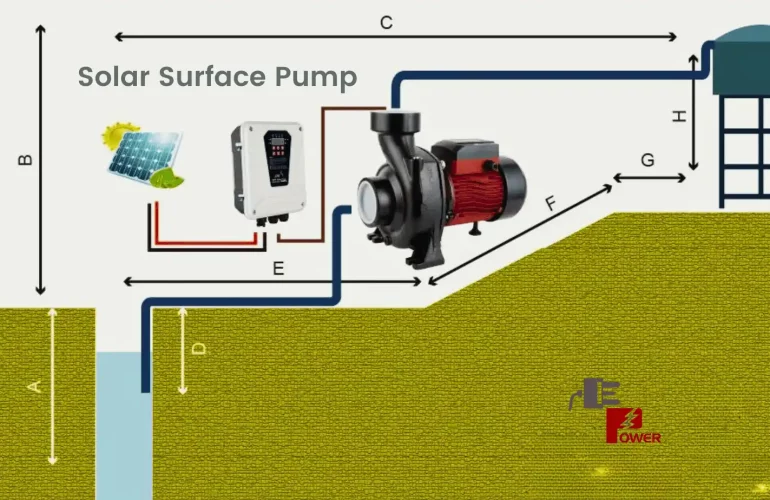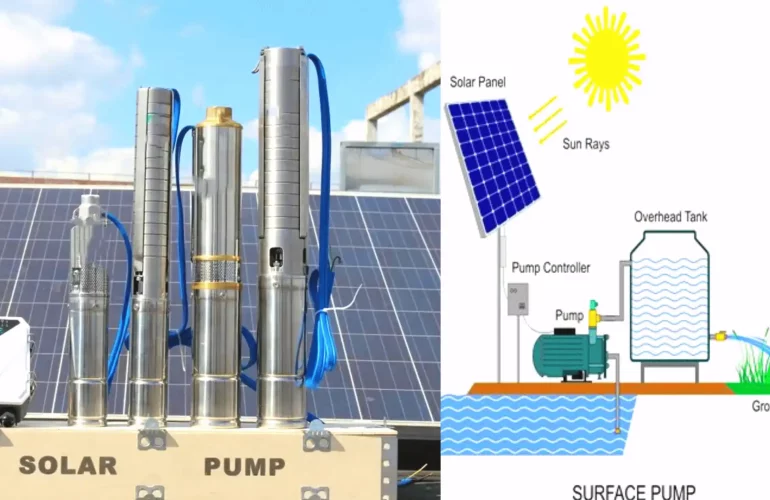Types of Solar Water Pumps in Uganda: Harnessing Sunshine for Clean Water
Solar water pumps in Uganda are ushering in a new era of clean and sustainable water access. In a nation where sunlight bathes the landscape, these innovative pumps harness the power of the sun to transform the way communities secure their water supply.
Beyond a mere technological solution, solar water pumps have become a lifeline, providing reliability and resilience in the face of water challenges.
Join us on a journey to explore the impact, advantages, and diverse applications of solar water pumps in Uganda, where the quest for clean water meets the boundless potential of solar energy.
Traditional Water Pumping Systems in Uganda
Uganda has long relied on traditional water pumping technologies, which are expensive and have negative environmental consequences. It’s time to make a shift.
Submersible Solar Water Pumps

1.1 Efficient Water Extraction from Deep Sources
Submersible solar water pumps in Uganda are becoming increasingly popular for their ability to draw water from deep sources, making them excellent for agricultural applications.
Surface Solar Water Pumps
2.1 Versatile Solutions for Shallow Water
Surface solar water pumps are adaptable and appropriate for shallow water sources. They have applications ranging from domestic use to community water supply.
Solar-Powered Centrifugal Pumps
3.1 Harnessing Rotational Kinetic Energy
Centrifugal pumps use rotating kinetic energy to transfer water, providing a sustainable solution for irrigation and other agricultural purposes.
Solar-Powered Diaphragm Pumps
4.1 Effective Small-Scale Water Supply
Diaphragm pumps operate by flexing a diaphragm to create suction. These solar-powered pumps are effective for small-scale water supply, crucial for rural communities.
Advantages of Solar Water Pumps
Solar water pumps provide several advantages, ranging from cost-effectiveness to environmental sustainability, and provide a dependable and environmentally responsible option.
Cost-Effectiveness
5.1 Long-term Savings
The initial investment in solar water pumps pays off over time, significantly reducing operational costs and providing a financially sustainable water solution.
Environmental Sustainability
5.2 Contributing to a Greener Ecosystem
Harnessing solar power for water pumping minimizes environmental impact, contributing to a cleaner and greener ecosystem.
Reduced Dependency on Grid Power
5.3 Ensuring Continuous Water Access
In a country with intermittent power supply, solar water pumps offer independence from the grid, ensuring continuous water access.
Applications of Solar Water Pumps in Uganda

Agriculture
6.1 Facilitating Irrigation and Crop Cultivation
Solar water pumps play a vital role in agriculture, facilitating irrigation and crop cultivation even in off-grid areas.
Rural Water Supply
6.2 Bringing Clean Water to Remote Areas
Bringing clean water to remote rural areas, solar water pumps address the water scarcity challenges faced by many Ugandan communities.
Livestock Watering
6.3 Sustainable Solution for Animal Well-Being
In the livestock sector, solar water pumps provide a sustainable solution for watering animals, enhancing the overall well-being of herds.
Choosing the Right Solar Water Pump
When deciding on the best solar water pump in Uganda, consider the water source, desired water volume, and maintenance requirements.
Consideration of Water Source
7.1 Matching Pumps to Water Sources
Different pumps suit different water sources; understanding the depth and quality of the water is crucial for optimal performance.
Water Requirement
7.2 Estimating Water Demand
Estimating water demand helps determine the pump’s capacity, ensuring it meets the needs of the intended application.
Maintenance and Durability
7.3 Ensuring Long-Term Reliability
Choosing a pump with low maintenance requirements and a durable design ensures long-term reliability and cost-effectiveness.
Installation and Maintenance Tips

Proper Placement
8.1 Maximizing Sunlight Exposure
Installing solar water pumps in strategic locations maximizes sunlight exposure, optimizing their efficiency.
Regular Cleaning and Inspection
8.2 Preventing Clogging and Damage
Routine cleaning and inspection prevent clogging and damage, ensuring consistent pump performance.
Troubleshooting Common Issues
8.3 Addressing Issues Promptly
Being aware of and addressing common issues promptly enhances the longevity of solar water pump systems.
Conclusion
The future looks brighter for Uganda as it harnesses the power of the sun to offer clean water to its people. Solar water pumps are a lifeline for communities, supporting sustainability and resilience in the face of water difficulties.
FAQs About Solar Water Pumps in Uganda
Solar water pumps are built to last, with average lifespans ranging from 15 to 25 years. Regular maintenance and careful treatment can considerably extend their lifespan, assuring long-term water access.
The best solar water pump is determined by a number of parameters, including the water supply, needed flow rate, and application. Submersible pumps are best suited for deep water sources, whilst surface pumps are best suited for shallow locations. Choosing the best pump requires taking into account your specific needs and situations.
The amount of solar power required for a water pump is determined by factors such as the pump’s capacity, the amount of sunlight available, and the volume of water required. A solar water pump will typically require a solar panel system ranging from 500 watts to 2 kilowatts. Assessing the unique needs of your pump and location is required to accurately determine your solar needs.
Absolutely! Solar water pumps are a worthwhile investment that provides long-term benefits. They provide cost-effective and long-term water solutions, lowering operational costs and reliance on grid electricity. Solar water pumps are a significant and worthwhile solution for water access in Uganda because of the environmental impact and beneficial community developments they bring.





Hi there, just became alert to your blog through Google, and found that it is truly informative.
I am gonna watch out for brussels. I will be grateful if you continue this in future.
A lot of people will be benefited from your writing.
Cheers!
Thank you so much for your kind words and for discovering our blog! We’re thrilled to hear that you found our content informative.
At Easy Power, we are passionate about providing high-quality solar power solutions and home security systems to help you create a safer, more sustainable future. Your encouragement inspires us to continue delivering valuable information and insights.
If you have any specific topics you’d like us to cover in the future or any questions about our products and services, please feel free to let us know. We’re here to help!